Case study
How RubyGarage Built an Online Marketplace for Home Services for Saudi Arabia's Digital Transformation

Challenge

RubyGarage was tasked by Naxy Nwodo to create CallOnDuty, an online marketplace to connect local service providers with consumers for home tasks. The platform needed to be user-friendly and efficient, saving customers time and effort.

Quality assurance was crucial; CallOnDuty had to ensure reliable services through reviews or vetting processes. The aim was to offer only trustworthy providers to consumers.

Security was a must, especially in handling transactions. The platform must protect user financial data and ensure price transparency for customers to compare providers.

Flexibility in scheduling was essential. The platform had to offer convenient booking options for customers while allowing service providers to manage their availability.

Lastly, excellent customer service was indispensable for resolving issues and ensuring a smooth experience. A straightforward dispute-resolution process was needed to protect both parties.
Solution
From initial brainstorming to continuous improvement, the RubyGarage team employed a holistic approach to bring CallOnDuty to life. Leveraging in-depth market research, audience segmentation, and Agile methodologies, we ensured the platform not only met industry needs but also offered a user-centric, secure, and scalable solution for both service providers and consumers.
-
01
1. Idea generation
The journey began with brainstorming sessions, where we churned out various ideas to revolutionise the home services sector. The best of these was refined into the concept of CallOnDuty.
-
02
2. Market research
Our team delved deep into market analytics and user behaviour to validate the initial idea. This research provided us with valuable insights into the industry's pain points and opportunities.
-
03
3. Audience segmentation
We identified and categorised our target audience based on several factors, such as needs, geography, and behaviour. This helped us in tailoring our product to meet specific customer needs.
-
04
4. Feasibility analysis
An in-depth feasibility study was conducted to evaluate the practicality and financial viability of the project. This phase ensured that CallOnDuty was not just a great idea but also a feasible one.
-
05
5. Product hypothesis
Based on our research and analysis, we formulated a clear product hypothesis outlining what CallOnDuty aimed to achieve and how we would measure its success.
-
06
6. MVP (Minimum Viable Product) planning
We outlined the core functionalities and features needed for a Minimum Viable Product (MVP). This roadmap served as our blueprint for initial development.
-
07
7. Roadmap
A detailed project roadmap was drawn up, complete with milestones and timelines. This plan guided us through development and aligned the team with project goals.
-
08
8. Tech stack selection
We chose a modern technology stack, combining Ruby on Rails for the backend and React.js for the frontend, to turn our vision for CallOnDuty into reality.
-
09
9. Team formation
Specialised teams were assembled, including frontend and backend developers, UI/UX designers, and quality assurance experts. Each team had a defined role in bringing CallOnDuty to life.
-
10
10. UI/UX designing
Our designers crafted an intuitive and visually appealing user interface. They focused on user-centric design to enhance the overall user experience.
-
11
11. Agile development
We employed Agile methodologies to facilitate a flexible and collaborative development process. Regular sprints and stand-up meetings ensured the project stayed on track.
-
12
12. Quality assurance
Before any code went live, it underwent stringent quality checks. This phase ensured that CallOnDuty met all functional and security benchmarks.
-
13
13. Alpha release
The first version of CallOnDuty was rolled out to a select group of users. This alpha release helped us to identify any major issues that needed urgent attention.
-
14
14. Beta release
Following tweaks and improvements, a more polished version was released to a wider audience for beta testing. This phase provided broader insights into user interaction and possible improvements.
-
15
15. Feedback loop
After each release, we collected user feedback to understand what worked and what didn't. This feedback was invaluable for making data-driven decisions.
-
16
16. Continuous improvement
Armed with user feedback and analytics, we entered a cycle of continuous improvement, fine-tuning features, and rolling out updates to meet user expectations better.
Results
CallOnDuty, developed by RubyGarage, is a streamlined online marketplace connecting local service providers and consumers for home-related tasks. It enables users to discover services, review profiles, and securely book suitable providers. For providers, it's an opportunity to highlight their skills, expand their reach, and enhance their business. It epitomises ease, security, and user-friendliness in managing everyday home tasks.
Unfailing project delivery
Following a meticulous project plan, RubyGarage delivered CallOnDuty on schedule, meeting all established milestones.
Tailored features
Distinctive features, including a powerful search engine, user-friendly booking system, and secure payments, were crafted and integrated, amplifying CallOnDuty's uniqueness.
Cohesive brand incorporation
We seamlessly blended CallOnDuty's brand elements, delivering a visually appealing and consistent user experience.
Rigorous quality checks
Through thorough testing, we ensured optimal performance, reliability, and security, enhancing user confidence in the platform.
Smooth deployment
We facilitated a successful launch, offering indispensable support during the setup, data migration, and deployment stages.
Enabling operation
We provided extensive training and documentation, bolstering the CallOnDuty team's ability to manage their platform.
Successful product launch
CallOnDuty was launched successfully, meeting the project timeline and budget constraints, thus affirming RubyGarage's prowess in efficient project management and development.
Broad service provider inclusion
The platform launched with a diversified list of vetted service providers, immediately ensuring a wide range of services available to consumers.
Immediate user adoption
Within the first month of launch, CallOnDuty garnered a significant user base, demonstrating the market demand for a robust, multi-category home services platform.
Secure transactions
From day one, the platform's secure payment gateway has ensured that there are zero incidents of transaction fraud, instilling confidence among the users.
Strong review system
Upon launch, the platform’s review and rating system received active participation, indicating user engagement and the system's ease of use.
Operational efficiency for providers
The platform's easy-to-use scheduling features enabled service providers to manage their availability efficiently, leading to increased bookings and revenue within the first quarter.
Winning user approval
CallOnDuty's positive reception post-launch highlights RubyGarage's successful development efforts, with users praising the platform's intuitive design and robust features.
Positive feedback loop
A feedback loop was successfully established post-launch, providing actionable insights for ongoing platform enhancements.
Accelerated business expansion
RubyGarage's successful execution has propelled CallOnDuty's growth, marking an upswing in registered users, transactions, and overall user engagement.
Key features
CallOnDuty focuses on convenience, trust, and efficiency for both service providers and consumers. From intuitive search and secure payments to robust analytics, every feature is designed to simplify the process of connecting local service providers with consumers, ultimately enhancing the user experience and driving business growth.
Service listing
Providers can enumerate and detail their services with descriptions, images, and pricing. This feature simplifies listing management and updates.
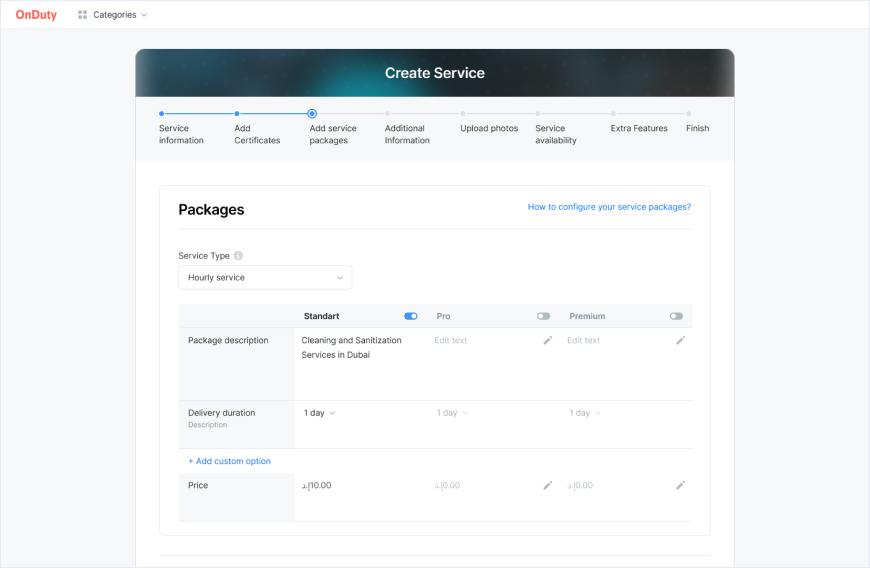
Intuitive search and filtering
We created an efficient search function that allows customers to narrow down services using criteria like cost, location, ratings, or specific types.
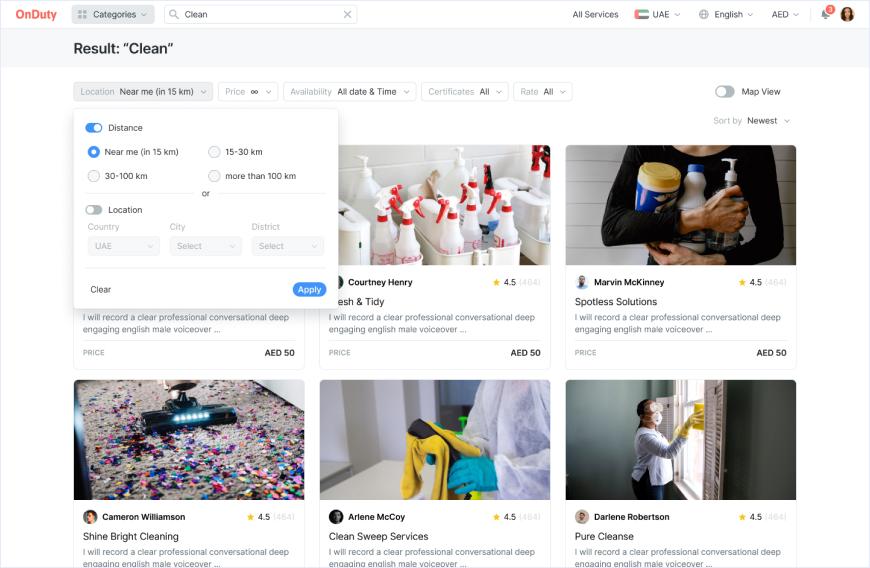
Scheduling and booking
Customers can readily book services, specify job requirements, and select a payment method, streamlining the booking process.
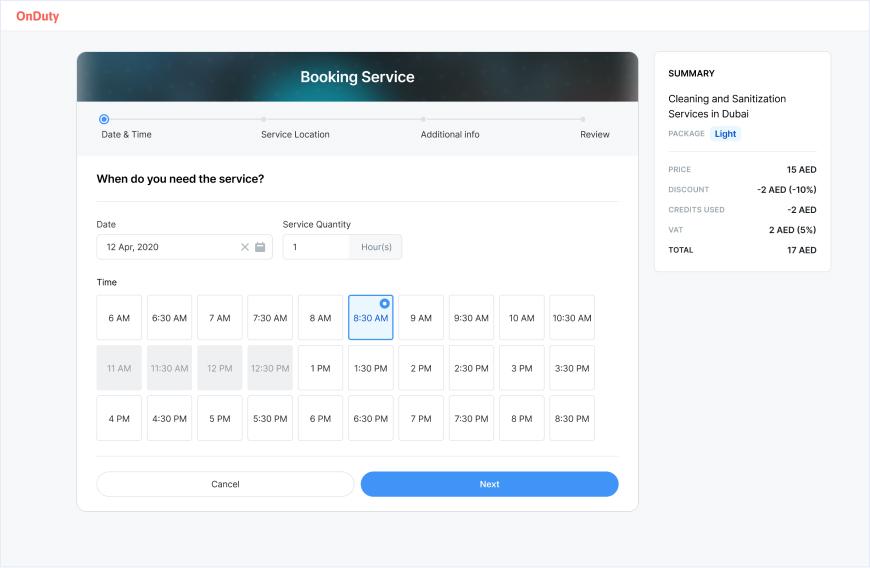
Secure payment processing
A top-tier secure payment gateway ensures safe transactions, supporting a range of payment options like cards, online banking, or digital wallets.
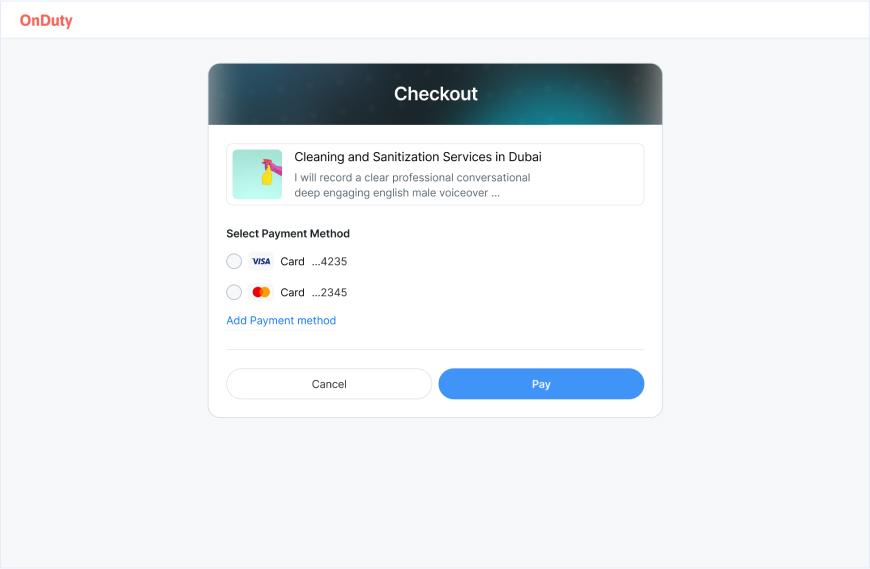
Review and rating system
A transparent review system fosters trust and maintains service quality by allowing customers to provide feedback on their service providers.
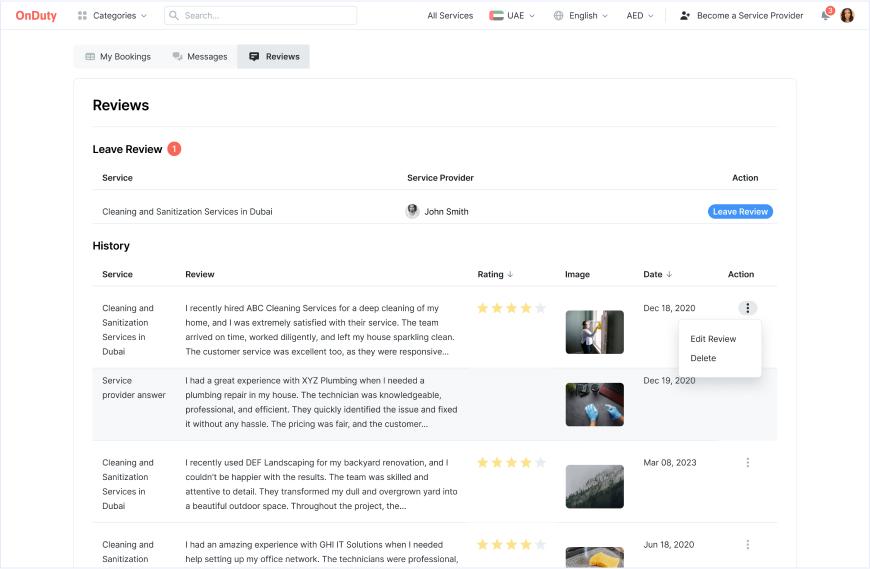
User registration and profile management
We made it easy for service providers and customers to create, customise, and manage profiles. Providers can share skills, rates, and availability information, while customers can save preferences and manage bookings.
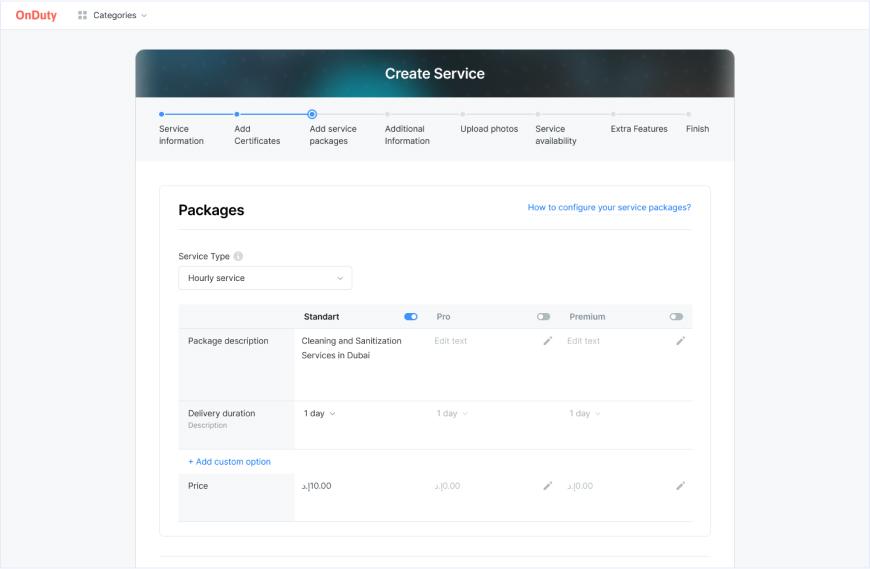
Messaging system
A built-in messaging system lets customers and providers discuss details, make arrangements, or resolve issues without leaving the platform.
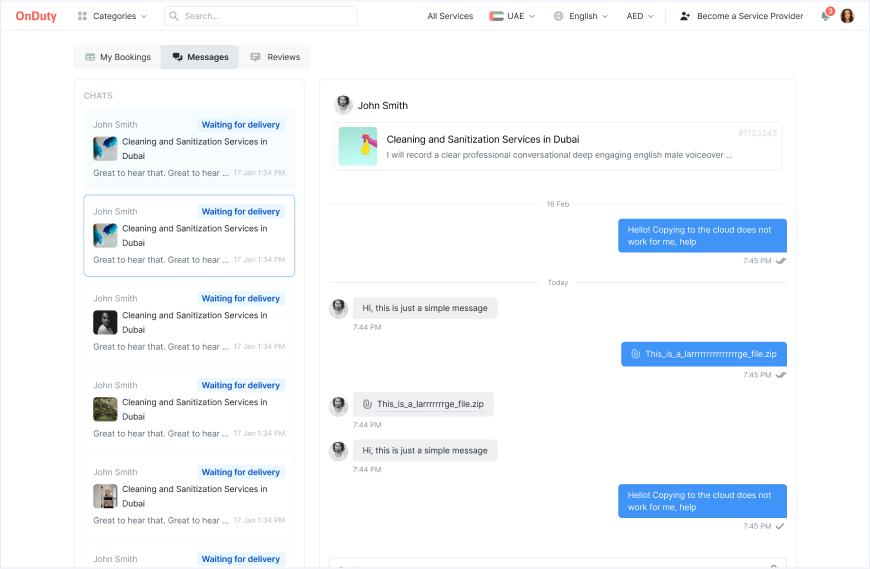
Geolocation
This feature matches customers with local providers, provides navigational aid, and lets customers track a service provider's real-time arrival.
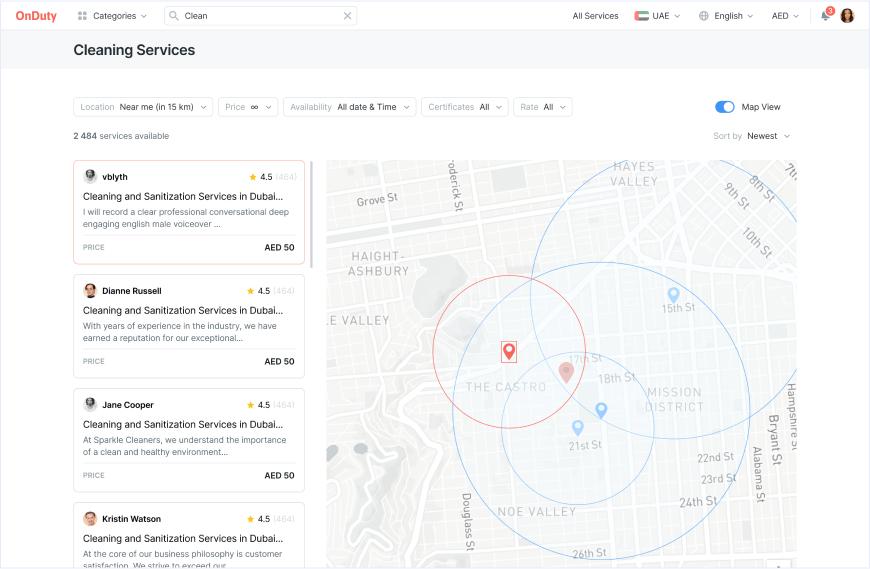
Automated reminders
Notifications inform users about important updates like new messages, upcoming appointments, booking alterations, or fresh reviews.
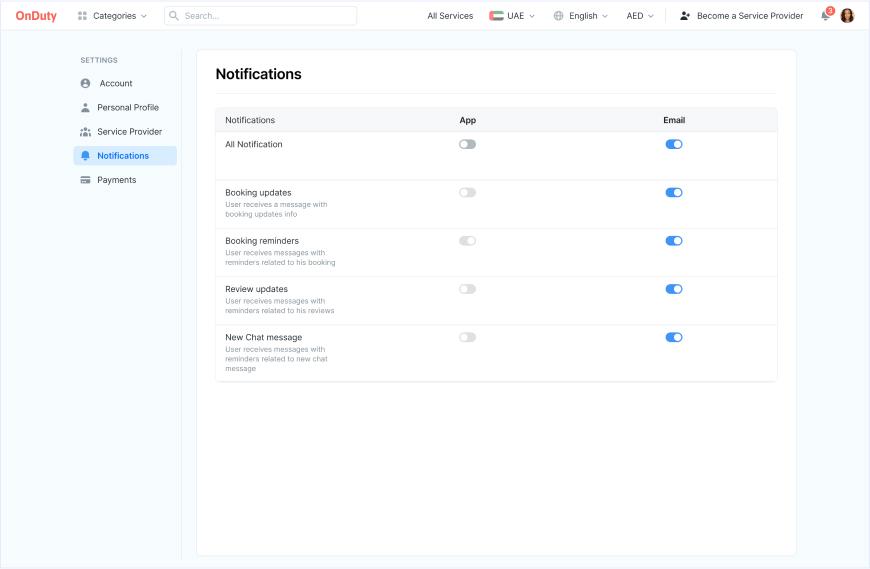
User dashboard
This feature gives users a snapshot of their activity, including booking history, upcoming services, and favourite providers. For providers, it summarises earnings, upcoming jobs, and customer feedback.
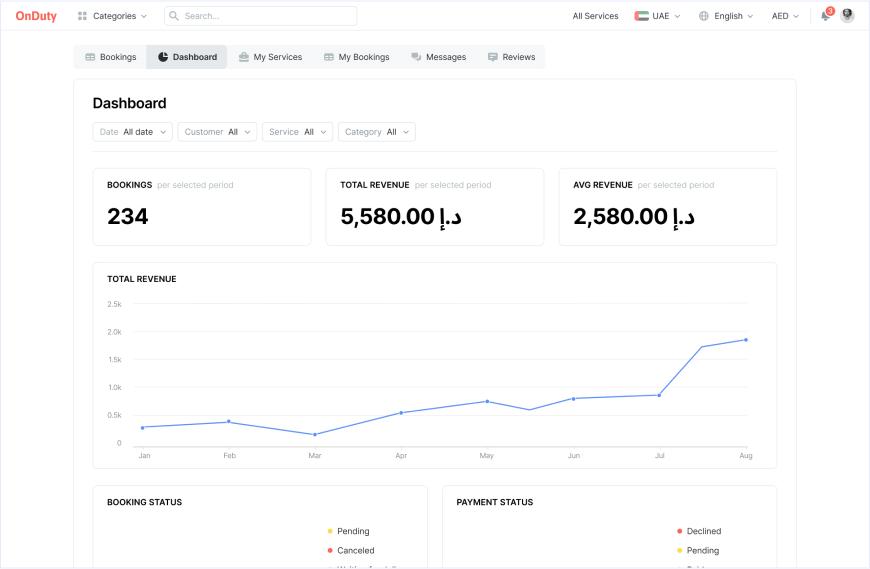
Insightful analytics and reports
We incorporated data analytics and reporting features for platform administrators to gain insights into user behaviour, popular services, peak usage periods, and more. These valuable insights help drive platform growth and improvements.
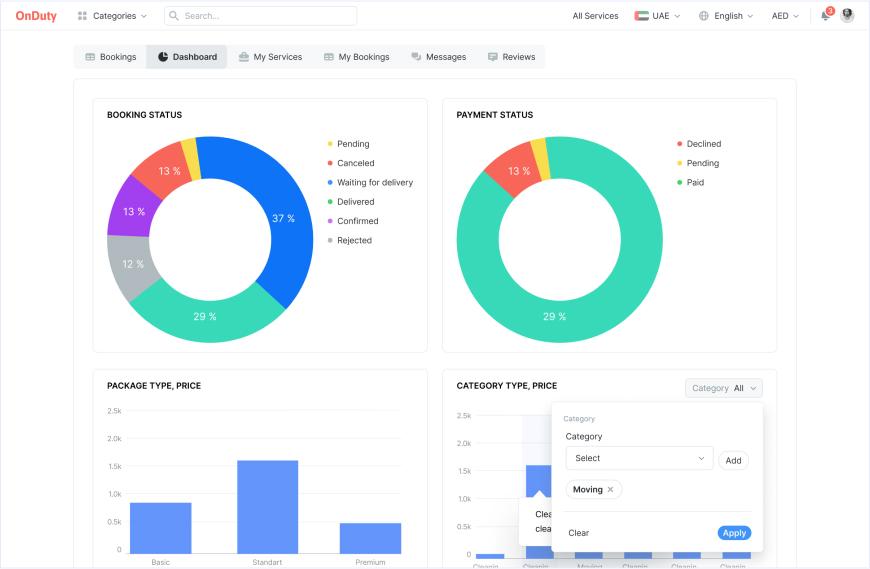
Customer support
The help centre fields common queries and offers assistance via live chat, email, or a phone line for user issues.
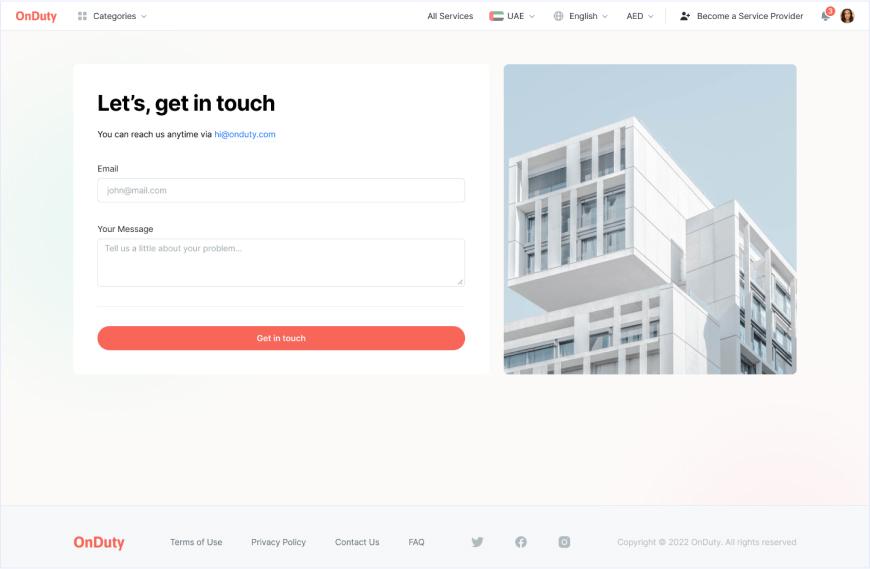
Technology stack
We selected a technology stack combining the modern Ruby on Rails framework with Ruby gems and approaches, a powerful frontend, and other supporting technologies.
Frontend
Ensures a seamless and engaging user experience, increasing customer retention and satisfaction.
Frontend
Typescript is a statically typed superset of JavaScript that adds optional types, providing a safer and more efficient development experience.
React.js is a JavaScript library with a component-based architecture for building user interfaces, particularly single-page applications.
React Router is a standard routing library for React that manages and navigates between different components based on the browser's URL.
Material-UI is a popular React UI framework with a set of pre-designed components that follow Google's Material Design principles.
Redux is a predictable state container for JavaScript apps that helps you write applications that behave consistently, run in different environments (client, server, and native), and are easy to test.
Redux Saga is a middleware library for Redux that manages side effects, such as asynchronous actions like fetching data.
Backend
Facilitates efficient data processing and secure user authentication, streamlining operations and boosting trust.
Backend
Ruby on rails is a popular, full-stack web application framework for the Ruby language which emphasises convention over configuration and follows the MVC pattern.
Trailblazer is a new architectural layer for Ruby On Rails and other Ruby frameworks, introducing several high-level abstractions to structure applications.
Sidekiq is a background job processor for Ruby, useful for running tasks asynchronously outside of the main request-response cycle.
ActiveAdmin is a Ruby on Rails plugin for generating administration-style interfaces.
Devise is a flexible authentication solution for Rails applications with support for features such as password encryption, user registration, and session management.
Puma is a fast, concurrent web server for Ruby and Rack applications that can handle multiple requests simultaneously.
ActiveModelSerializers provides a convention-based approach to serialising Ruby objects based on their model layer, suitable for use in APIs.
Data management
Offers fast and reliable data storage, analytics, and search features, enhancing user experience and operational insights.
Data management
PostgreSQL is a powerful, open-source object-relational database system with a strong emphasis on extensibility and standards compliance.
Redis is an in-memory data structure store used as a database, cache, and message broker.
Elasticsearch is a powerful, distributed, RESTful search and analytics engine capable of addressing many use cases.
Pg_search builds ActiveRecord named scopes that take advantage of PostgreSQL's full-text search.
Searchkick is a Ruby gem that simplifies, optimises, and adds extra functionality to Elasticsearch in Ruby on Rails applications.
Quality assurance and security
Prioritises a secure, bug-free environment through comprehensive testing and real-time monitoring, safeguarding user data and brand reputation.
Quality assurance and security
RSpec is a behaviour-driven development (BDD) testing framework for Ruby.
FactoryBot is a library for setting up Ruby objects as test data.
Capybara is an acceptance test framework for web applications in Ruby.
Omniauth is a flexible authentication system for Rack-based Ruby applications, supporting multiple strategies like OAuth and LDAP.
CanCanCan is an authorisation library for Ruby and Rails applications that restricts what resources a user is allowed to access.
Rack Cors is a middleware for Rack-based applications that supports Cross-Origin Resource Sharing (CORS), allowing web applications to specify which domains are allowed to make requests.
Monit is a synchronisation construct that allows methods to be executed atomically, preventing multiple threads from entering a method simultaneously in Ruby.
Sentry provides error tracking that shows you every crash in your stack as it happens, with the details needed to prioritise, identify, reproduce, and fix each issue.
Integrations
Integrates a suite of essential services to streamline payment processing, enhance user experience, facilitate seamless communication, and expand customer support capabilities.
Integrations
Stripe API enables smooth and secure financial transactions, increasing revenue streams and customer trust.
PayPal provides an additional payment option, enhancing customer convenience and potentially increasing conversion rates.
Google Maps enhances the user experience by offering real-time location tracking and service location-based searches.
Twilio for SMS facilitates immediate communication through automated text message notifications for booking confirmations, updates, and cancellations.
SendGrid for email manages automated email notifications for transactional and promotional purposes, enhancing customer engagement and retention.
Zendesk offers a comprehensive customer support suite, including chat and ticketing systems, to improve customer satisfaction and issue resolution.
Google Translate allows the platform to offer content in multiple languages, broadening its reach and making the service accessible to a diverse user base.
Infrastructure management
Designed for high scalability and reliability, ensuring the business can adapt quickly to market demands and user needs.
Infrastructure management
AWS (Amazon Web Services) is a comprehensive and widely adopted cloud platform that offers a range of cloud computing services, including computing power, storage, and databases, ensuring the platform's scalability, reliability, and security.
Docker is a platform that automates container application deployment, scaling, and management, enabling consistent and efficient application delivery.
Kubernetes is a container orchestration platform for automating deployment, scaling, and managing containerised applications, which helps ensure the high availability and scalability of the platform.
New Relic is a performance monitoring tool that provides real-time insights into the functioning of your web applications, allowing for data-driven decisions.
Testimonial
With the successful deployment of CallOnDuty, RubyGarage has delivered a tangible impact on Saudi Arabia's Vision 2030 initiative, a strategic roadmap aimed at steering the country away from oil dependence, diversifying the economy, and uplifting public service sectors. Here's how CallOnDuty became an integral part of this transformation:
-
Championing digitisation
CallOnDuty, as an online marketplace for home services, has ignited a digital revolution in Saudi Arabia's service sector, perfectly aligned with Vision 2030's goal of capitalising on digital technology to revolutionise business processes and augment service delivery.
-
Cultivating economic opportunities
By crafting a platform for local service providers, CallOnDuty has generated new employment opportunities, spurred entrepreneurship, and nurtured small and medium-sized enterprises (SMEs), echoing the economic growth objectives of Vision 2030.
-
Enriching customer experience
With its user-centric interface, innovative features such as real-time tracking, and a trustworthy review system, CallOnDuty has significantly elevated the customer experience, mirroring Vision 2030's ambition of cultivating a vibrant society with high living standards.
-
Advocating a cashless economy
CallOnDuty, with its integrated secure payment gateways, is a strong advocate for cashless transactions, a cornerstone of the digital economy.
-
Empowering non-oil sectors
By fostering growth in the home services sector, CallOnDuty contributes to the diversification of Saudi Arabia's economy, resonating with the central ethos of Vision 2030.
-
Inspiring technological adoption
The success of CallOnDuty serves as a beacon, encouraging other businesses to take the digital leap and integrate modern technological solutions into their operations.

Project Lead, CallOnDuty
“Working with RubyGarage on the CallOnDuty project has been a phenomenal experience. Their technical proficiency, commitment to our vision, and proactive problem-solving approach significantly contributed to the platform's success. From their expertise in Ruby on Rails and React.js to their excellent project management skills, RubyGarage has exceeded expectations in every aspect. They have been integral in driving digital transformation in Saudi Arabia's home services sector, aligning perfectly with Vision 2030. I highly recommend RubyGarage for their top-notch software development services.”
Looking to build a thriving online service marketplace? We’re here to help.
Our Advantages
-
Free & non-binding offer
-
13+ years in the development and service design market
-
160+ released projects
-
150+ In-house specialists
-
Needs analysis instead of sales talk
-
Valuable suggestions from experts in the field for your project


















